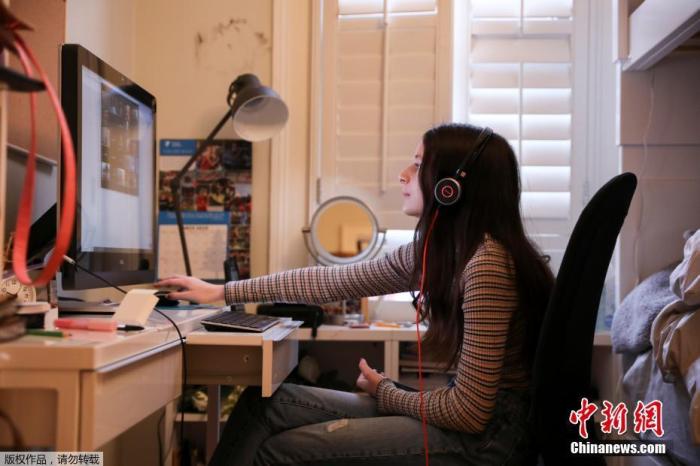China News Service, July 15th. According to statistics from Johns Hopkins University in the United States, as of 7:34 on July 15th, Beijing time, there were more than 13.27 million cases of new crowns diagnosed worldwide, and a total of more than 576,000 deaths. The director of the US Centers for Disease Control and Prevention said that the US epidemic has not yet come out of the predicament; WHO officials have called for politicization of the problem of school reopening; in order to prevent the epidemic situation, many countries have once again adopted restrictive measures; at the same time, some countries have rescued Economy, announced an increase in capital investment.
Data Map: US President Trump. China News Agency reporter Chen Meng
The epidemic spreads, Trump calls for school to be reopened
At present, there are more than 3.42 million diagnosed cases in the United States and more than 136,000 deaths. On the 14th, Robert Redfield, director of the US Centers for Disease Control and Prevention, said that there is still a clear spread of the virus throughout the United States. Although the situation is much better than in the spring, "there has not been out of the predicament." "On the issue of controlling the epidemic, We still have some way to go."
Recently, US President Trump ignored the still grim reality of the epidemic and continued to put pressure on schools to reopen as soon as possible. Trump said that those who opposed the reopening of schools were doing political calculations, hoping to prevent him from being re-elected. On the 14th, several state governments including New Hampshire, North Carolina, and Delaware announced plans to reopen schools in the fall.
The four former directors of the US Centers for Disease Control published a commentary article in the Washington Post about the CDC’s guidelines on school resumption, saying that although the guidelines were revised after approval, it is not uncommon It’s very unusual that the policy was destroyed after it was issued.” They said that they have never seen science so influenced by politics.
On March 23, local time, online learning was conducted at home in New York State, USA.
Ryan, the executive director of the World Health Organization's emergency program, said that school reopening is an important part of a long-term anti-epidemic strategy, emphasizing that "the problem of school reopening cannot be politicized." He said that schools should not be reduced to another political element, "We need to protect the rights and interests of children to the greatest extent, including the rights to receive education and protect health."
In addition, the epidemic situation of US military bases in Japan continued to ferment. As of 6 p.m. local time on the 14th, there were a total of 100 new crown infections in the US military base in Okinawa. Among them, three of the diagnosed people entered Japan from Tokyo Haneda Airport. Before the test results were released, they lied to Japan that they would rent a car, but actually took a civil aviation plane. The Japanese defense minister expressed dissatisfaction.
Many countries take restrictive measures to prevent epidemic rebound
Recently, the outbreaks in Victoria and New South Wales in Australia have rebounded, and the number of confirmed cases continues to increase. To this end, the multi-state government has stepped up action restrictions to prevent the spread of a new wave of the epidemic to more regions.
The picture shows India under the epidemic.
In India, as the number of confirmed cases continues to increase, the Bihar Government has decided to implement a 15-day blockade from the 16th, and the city of Bangalore, the capital of Karnataka, will implement a one-week blockade from the 14th.
A spokesman for the Thai New Crown Epidemic Management Center said on the 14th that two foreigners who entered Thailand were diagnosed with the new crown virus recently, which triggered public concerns about the possible local transmission. Thailand decided to suspend the entry of foreigners.
On the same day, Canadian media reported that the governments of Canada and the United States have agreed to extend the closure of the border between the two countries until August 21, prohibiting unnecessary cross-border travel.
Some countries made moves to save the economy after the epidemic
In order to save the economy affected by the epidemic, many governments have announced increased investment.
On July 14, the Korean government issued an economic development plan, planning to invest more than 100 billion US dollars in the next five years to vigorously develop the digital economy and green economy in order to cope with the impact of the epidemic, increase employment, improve people's livelihood, and promote the transformation and upgrading of the Korean economy.
On July 6, local time, the Louvre Museum in Paris, France was reopened, taking strict epidemic prevention and control measures to control the number of visitors. Affected by the epidemic, the Louvre was closed for 16 weeks. China News Service reporter Li Yangshe
On the same day, French President Macron said that France will invest at least 100 billion euros on the basis of 460 billion euros after the outbreak, to restore the economy, involving many fields such as industry, culture and education. In order to alleviate the employment problem of graduates caused by the epidemic, he promised to add 100,000 jobs in the public service field within 6 months.
On the 14th, Chilean President Pinella issued a series of economic assistance programs for middle-income groups, including cash grants, zero-interest loans, and rental subsidies. It is said that all households with a monthly income of between 500,000 Bissau and 2 million Bissau (approximately RMB 4,500 to 18,000) before the epidemic can apply for this assistance.

